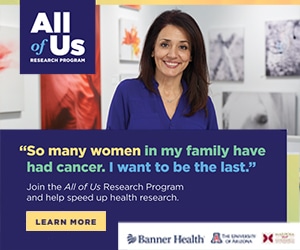All of Us Research Program is Building the Largest, Most Diverse Research Program of its Kind
Arizona contributing the highest number of participants, leading the effort nationally
October 13, 2021 (Phoenix, AZ) Medical research hasn’t always been inclusive, but the All of Us Research Program is changing that. A person’s experiences, genetics and environment all affect their health, but many minority racial and ethnic groups historically have been left out of research. As a result, researchers know less about their overall health and the effectiveness of medical interventions and treatments.
“In an age where we are discovering the promises of precision medicine, diversity in health research is more important than ever,” says Tomas Nuño, PhD, co-investigator for the All of Us Research Program UArizona-Banner and assistant research professor at the University of Arizona Mel and Enid Zuckerman College of Public Health. “As a matter of health equity, all groups should have the opportunity to be able to prevent disease and avoid suffering from disease regardless of racial, ethnic, gender or other identity.”
Health care often takes a one-size-fits-all approach. In the future, the goal is to employ precision medicine that tailors health care and treatments to the individual. The All of Us Research Program is part of the Precision Medicine Initiative that was launched in 2016.
“So much of what we’ve done in medicine over the years has not really taken into account individual differences,” said Francis Collins, MD, PhD, director of the National Institutes of Health. “We’re building a fundamental base of knowledge about how humans stay healthy and get sick and what to do about it. I think the practice of medicine will be altered in profound ways.”
The All of Us mission is simple: speed up health research. To do this, the program is asking one million or more people to share their unique health data. This information will be added to a database that researchers can access to conduct thousands of studies on health and disease. Health data from diverse people will help fill knowledge gaps and could help researchers develop new and better treatments that benefit everyone.
“When you have health information on a large, diverse group of individuals, you can start to study disease prevalence in a community,” said Jason Karnes, PharmD, PhD, BCPS, director of scientific programs for All of Us UArizona-Banner. And the research has already begun. More than 700 studies are being conducted in the All of Us Researcher Workbench using health data shared by participants. Researchers are studying everything from heart disease prevalence in minority populations to endometriosis health disparities to cancer outcomes with delayed treatment in low-income populations. The diverse data helps researchers better understand how different factors, including a person’s family history and environment, affect their health.
To ensure the data is reflective of the diverse U.S. population, researchers are conducting demonstration projects to “establish the reliability of the resource and the feasibility of the resource,” said Dr. Karnes who recently published an article in PLOS One on obesity prevalence in racial and sexual minority groups. He says the study showed that the All of Us participant base is “fairly representative of the U.S. population in terms of age, sex, race, and ethnicity.” This ensures all communities are represented in medical research.
In its fourth year of operation, All of Us UArizona-Banner is leading the country in enrollments. More than 45,000 core participants have shared their health data so researchers can better understand how genes, environment and lifestyle affect health.
With your help, the next health discovery could come from Arizona. To learn more or enroll, visit AllofUsAZ.org/Arizona or call 877-268-2684.
The University of Arizona-Banner Health Program is supported under the National Institutes of Health All of Us Research Program funding award OT2OD026549 with previous awards UG3OD023171-01 and UG3OD023171-01S1 and the CEAL funding award OT2-HL156812.
“All of Us” and the All of Us logo are registered service marks of the U.S. Department of Health & Human Services (HHS).
About the All of Us Research Program: The mission of the All of Us Research Program is to accelerate health research and medical breakthroughs, enabling individualized prevention, treatment, and care for all of us. The program will partner with one million or more people across the United States to build the most diverse biomedical data resource of its kind, to help researchers gain better insights into the biological, environmental, and behavioral factors that influence health. For more information, visit JoinAllofUs.org and allofus.nih.gov. For Arizona news, visit AllofUsAZ.org or Facebook, Instagram, and Twitter @AllofUsAZ.
About Banner Health: Headquartered in Arizona, Banner Health is one of the largest nonprofit health care systems in the country. The system owns and operates 30 acute-care hospitals, Banner Health Network, Banner – University Medicine, Banner Medical Group, long-term care centers, outpatient surgery centers and an array of other services, including Banner Urgent Care, family clinics, home care and hospice services, pharmacies and a nursing registry. Banner Health is in six states: Arizona, California, Colorado, Nebraska, Nevada and Wyoming. For more information visit www.BannerHealth.com.
About the University of Arizona Health Sciences: Located on campuses in Tucson and Phoenix, the University of Arizona Health Sciences is one of the top-ranked academic medical centers in the southwestern United States. UArizona Health Sciences includes the College of Medicine – Phoenix, College of Medicine – Tucson, College of Nursing, College of Pharmacy and the Mel and Enid Zuckerman College of Public Health. In addition, 12 UArizona Health Sciences centers and programs focus on cancer, neurodegenerative diseases, pain and addiction, and respiratory diseases; biomedical informatics, health technology innovation and simulation training; and precision health care and health disparities. A leader in next-generation education, biomedical research and public outreach, UArizona Health Sciences employs nearly 5,000 people, has approximately 4,000 students and 900 faculty members, and garners more than $200 million in research grants and contracts annually. For more information: uahs.arizona.edu (Follow us: Facebook | Twitter | YouTube | LinkedIn | Instagram).

